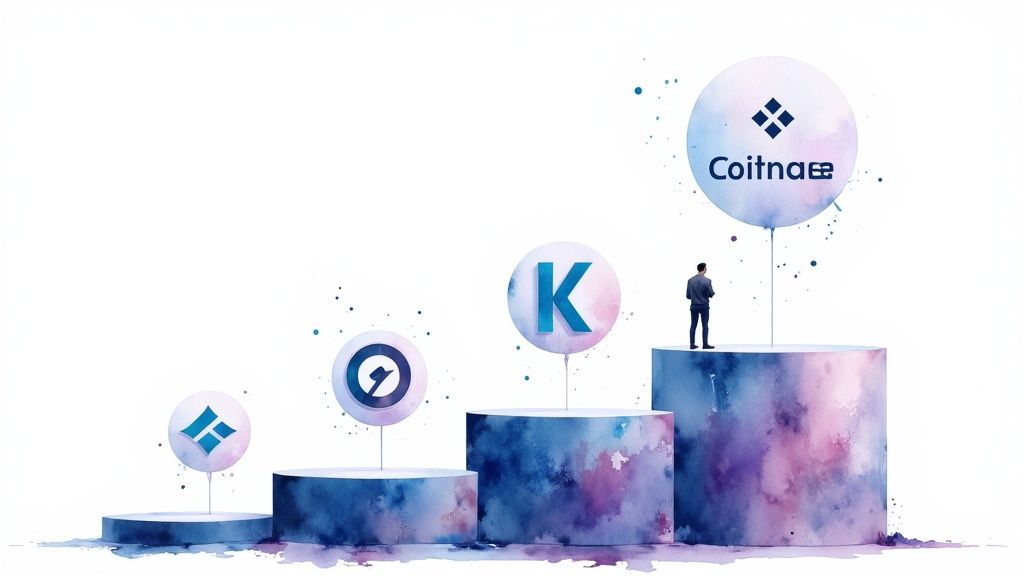




Cryptocurrency exchanges are online platforms designed to facilitate the buying, selling, and trading of digital assets. These platforms, which handle assets like Bitcoin and Ethereum, connect buyers and sellers, effectively creating a marketplace for secure transactions. This makes them an integral part of the cryptocurrency world, enabling both individuals and large institutions to participate in this growing market. To understand the intricacies of digital finance, we must first understand the role of these exchanges.
Crypto exchanges function similarly to traditional stock exchanges, but with a critical distinction: they deal solely with digital currencies. Users create accounts, deposit funds, and then place orders to buy or sell various cryptocurrencies. The exchange then matches these corresponding buy and sell orders, executing the trades and updating user balances. For instance, if someone wants to buy Bitcoin, they place a buy order stating the quantity and price they're willing to pay. The exchange matches this with a corresponding sell order, completing the transaction. This process allows for efficient price discovery and facilitates smooth trading. Understanding this core mechanism is essential for effective cryptocurrency trading.
The cryptocurrency exchange ecosystem encompasses various platform types, each designed with unique features for specific audiences. Centralized exchanges (CEXs) function as trusted third parties, holding user funds and overseeing the trading process. Conversely, decentralized exchanges (DEXs) operate without intermediaries, allowing users to trade directly with one another via smart contracts. There are also peer-to-peer (P2P) exchanges, which connect individual buyers and sellers directly, often providing enhanced privacy and flexibility regarding payment methods. This varied landscape caters to different trading preferences and risk tolerances. The choice of exchange type depends on individual needs and priorities, leading us to the importance of exchange size.
Exchange size, commonly measured by 24-hour trading volume, is a vital factor to consider when selecting a platform. Larger exchanges, often featured on top exchange lists, generally offer greater liquidity. This higher liquidity makes it easier to buy and sell cryptocurrencies without large price swings. Furthermore, larger exchanges typically support a broader selection of cryptocurrencies, providing users with more investment choices. However, larger exchanges can also be attractive targets for hackers, emphasizing the critical importance of security. Therefore, researching and comparing the largest exchanges is crucial for finding the right platform for your investment strategy. Let's explore some of the leading platforms in more detail.

Having explored exchange types and the significance of size, let's now examine some of the largest cryptocurrency exchanges currently dominating the market. These platforms handle a considerable portion of global cryptocurrency trading and offer a wide range of features for both individual and institutional investors. Understanding the strengths and weaknesses of these platforms is essential for anyone involved in cryptocurrency trading.
Binance consistently ranks among the top global exchanges, boasting an enormous 24-hour trading volume. This volume signifies its substantial market share and high liquidity, allowing users to quickly and efficiently buy and sell a vast array of cryptocurrencies. Binance's substantial user base contributes to a robust order book, which minimizes price fluctuations and ensures smoother trading, even during market volatility. This high liquidity, coupled with competitive fees and a wide array of supported cryptocurrencies, solidifies Binance’s position as a key player in the industry. Now, let's consider another leading platform, Bybit.
Bybit is another prominent cryptocurrency exchange known for its substantial trading volume and comprehensive features. The platform caters to both novice and experienced traders, providing a user-friendly interface coupled with advanced charting tools and derivative trading options. This combination attracts a broad range of users, from newcomers to seasoned traders seeking sophisticated instruments. Bybit’s ongoing expansion into new markets further contributes to its growing global influence within the crypto space. Next, we'll look at Coinbase Exchange.
Coinbase Exchange, also known as Coinbase Pro, stands out due to its strong security measures and regulatory compliance. This focus on security provides reassurance to users, particularly those newer to crypto trading, given the inherent risks associated with digital assets. In addition, Coinbase Exchange offers a relatively intuitive interface and extensive educational resources, making it a good option for beginners and intermediate traders alike. These characteristics contribute to its popularity and established position within the top tier of crypto exchanges. Let's move on to Kraken.
Kraken differentiates itself through its rigorous security practices and wealth of educational resources, appealing to traders who value safety and transparency. Its longstanding market presence contributes to a reputation for reliability, strengthened by its robust security infrastructure designed to protect user assets. Furthermore, Kraken's emphasis on educational content empowers users to make well-informed trading decisions, enhancing its overall value proposition. While these are some of the biggest exchanges, other platforms also deserve attention.
While the aforementioned exchanges represent some of the largest by trading volume, many other platforms deserve consideration. These exchanges may offer specialized services, focus on particular regions, or cater to niche markets within the crypto ecosystem. This diverse landscape gives traders a range of choices to suit different needs and preferences. You might find this article on how market dominance shifts over time interesting. These alternative platforms often introduce new features and contribute to the overall growth and evolution of the cryptocurrency market. Understanding this broader context is essential for a complete view of the digital asset trading arena. This breadth of choice empowers traders to select platforms aligned with their individual investment strategies and risk tolerance. It also encourages competition within the industry, ultimately leading to innovation and improved services for all users. Now, let's delve into the crucial topic of security and regulation.
Having explored some of the largest crypto exchanges, it's essential to examine the security infrastructure and regulatory environment in which they operate. Security is paramount in the cryptocurrency world due to the digital nature of assets and the potential for cyberattacks. Regulatory compliance is also increasingly important for building trust and long-term market stability. This section will delve deeper into these crucial factors.
Largest crypto exchanges employ various security measures to safeguard user funds and data. These often include two-factor authentication (2FA), which adds a layer of security by requiring a second form of verification beyond a password. For example, a user might enter a code from an authenticator app along with their password, making unauthorized access significantly more difficult. Many exchanges also utilize cold storage, holding a substantial portion of user funds offline, away from online threats. Cold storage acts like a vault, protecting the majority of assets from hacking attempts. Now, let's look at the impact of regulatory compliance.
The regulatory landscape for cryptocurrency exchanges is constantly changing. Different jurisdictions are implementing varying degrees of oversight, influencing how exchanges function and the services they can offer. As a result, the largest exchanges must adapt to meet local regulations in their operating regions. For example, some may need to obtain licenses, implement Know Your Customer (KYC) and Anti-Money Laundering (AML) procedures, and adhere to data protection rules. While adding complexity, these regulations contribute to greater transparency and accountability within the crypto market, building trust with users and attracting institutional investors. This strengthens the overall ecosystem. Now, let's examine the interplay between security and regulation.
Security and regulation are intertwined and vital for the overall health and sustainability of the cryptocurrency ecosystem. Strong security measures minimize the risks of hacks and financial losses, protecting individual users and market stability. Robust regulation provides a framework for responsible operations, fostering trust and encouraging wider participation. Both are essential for mainstream adoption and continued growth of the largest crypto exchanges. Choosing an exchange with strong security and a commitment to regulatory compliance is crucial for successfully navigating the cryptocurrency market. Next, we'll delve into the criteria for selecting an exchange.

Choosing the right cryptocurrency exchange is a critical step for anyone entering the digital asset market. With numerous platforms available, each with varying features and target audiences, making an informed choice can be daunting. This section outlines essential factors to consider when evaluating and choosing among the largest crypto exchanges, as this selection can significantly impact your trading experience and overall success.
Numerous factors contribute to a positive trading experience. Analyzing these aspects will help you make an informed decision.
Evaluating these factors alongside your trading needs and risk tolerance will help you choose the right exchange. A beginner may prioritize a user-friendly interface and educational resources, while an experienced trader may prioritize advanced charting and a wide selection of altcoins. The best exchange depends on your specific requirements. Thorough research is paramount. Investigate different platforms and compare their offerings before making your final decision. This diligence will help you find the ideal fit and set you on the path to success in cryptocurrency trading.

Having discussed choosing the right platform, let's consider the future of crypto exchanges. This dynamic landscape, with constant innovation shaping how digital assets are traded, presents both opportunities and challenges. Understanding these trends is crucial for navigating the future of digital finance and allows investors to adapt their strategies proactively.
Several key trends are set to reshape cryptocurrency exchanges. The rise of decentralized finance (DeFi) is pushing boundaries, and its integration with exchanges is increasingly relevant. This integration will likely include sophisticated trading tools and direct access to decentralized protocols through exchange accounts. Users might participate in yield farming or lending directly through their exchange account, for example. The growing interest in NFTs is also leading exchanges to incorporate NFT marketplaces, blurring the lines between traditional cryptocurrency trading and digital collectibles. This convergence of asset classes provides a more integrated investment experience.
Increased regulatory scrutiny will inevitably shape the development of crypto exchanges. As governments globally determine how to regulate digital assets, exchanges must adapt to comply with evolving rules. This requires investments in compliance and legal expertise. However, this clarity can also promote institutional adoption. As institutional investors enter the market, they demand the same regulatory compliance and security found in traditional markets. This pressure leads to stricter standards, professionalizing the industry. This increased participation can bring significant capital into the market, driving growth and maturity.
Artificial intelligence (AI) and automation will likely play a more significant role in the future of crypto exchanges. AI-powered trading bots can execute trades more quickly and efficiently, while automated customer support can enhance the user experience. This automation allows human resources to focus on complex tasks like developing new features and strengthening security. AI can also be employed to detect and prevent fraud, increasing security and trust. This increased efficiency and security is crucial for attracting and retaining users in a competitive environment.
Staying informed about emerging trends and adapting to regulatory changes is crucial for both exchanges and investors. This proactive approach enables informed decision-making and positions individuals to capitalize on future opportunities. This preparedness is vital for navigating digital finance and achieving long-term success in the cryptocurrency market.
Want to delve deeper into the crypto world? Coindive offers a comprehensive platform for tracking market trends, monitoring your favorite projects, and making informed investment decisions. Explore the future of crypto with us: Coindive